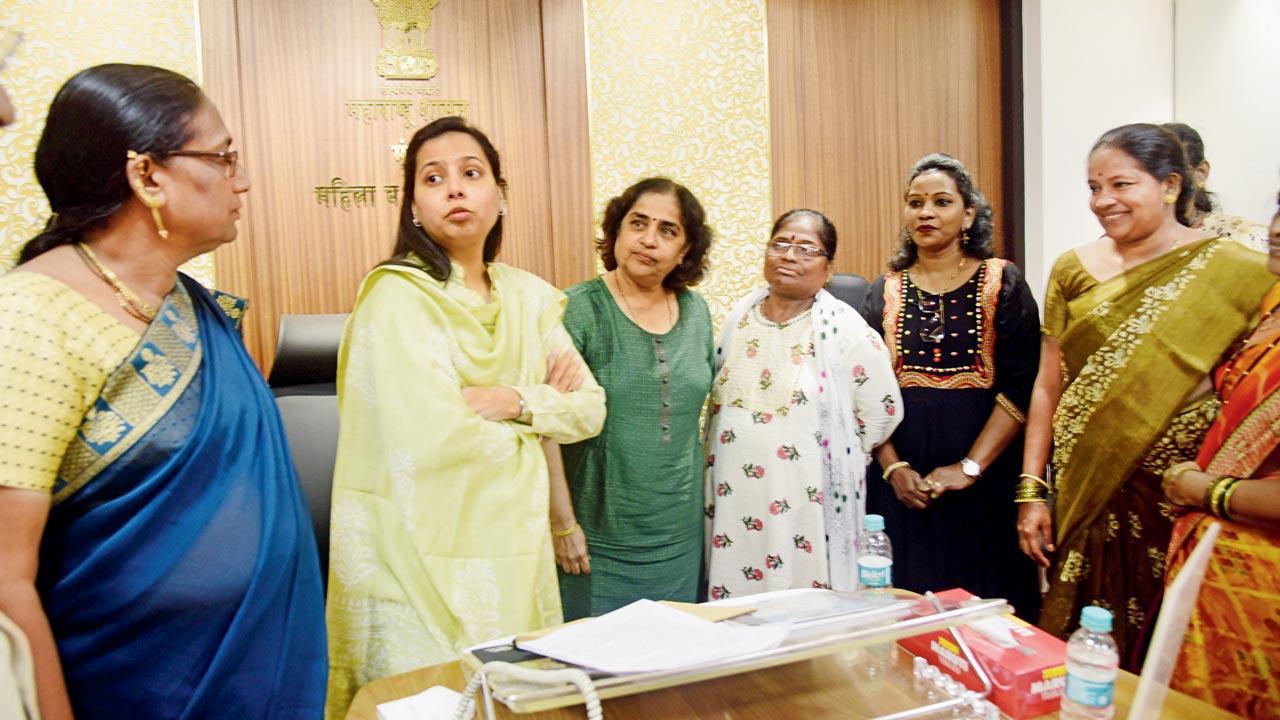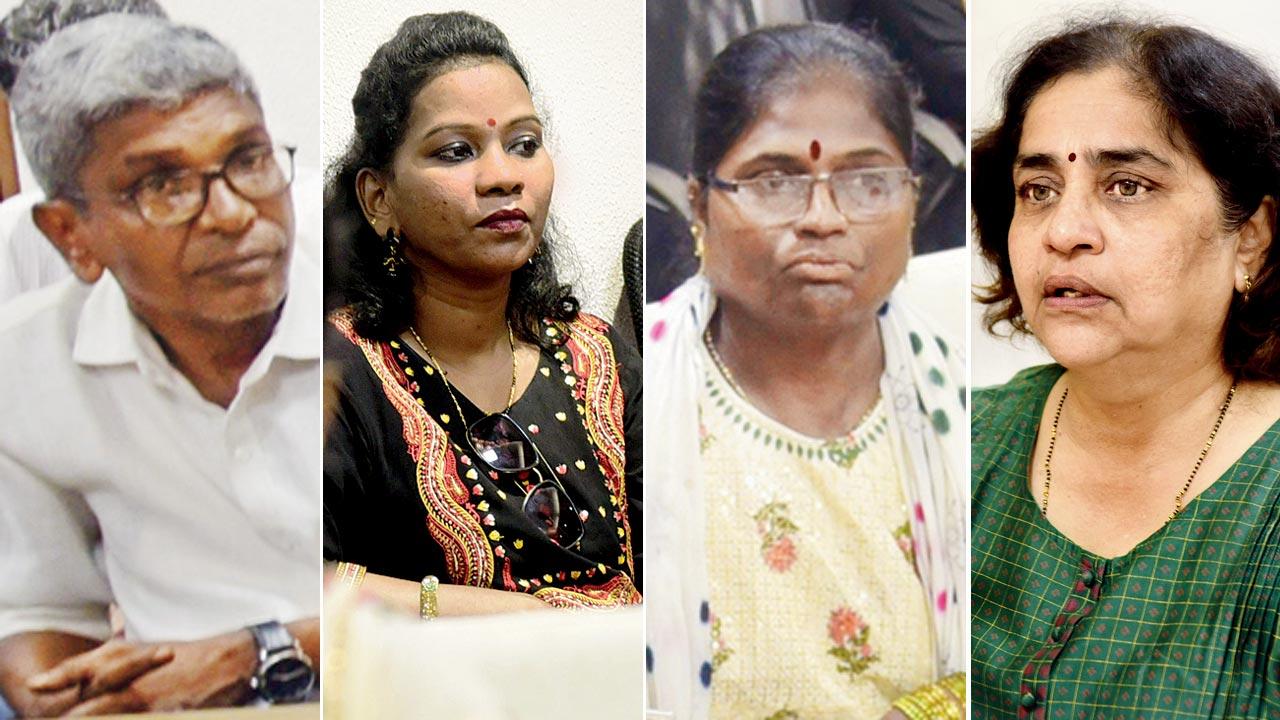Housemaids are a workforce that we take for granted in day-to-day life. So much so that we don’t even know how many of them exist in the state

A delegation comprising domestic workers and activists who work for their welfare met Women and Child Development Minister Aditi Tatkare on Thursday. Despite being a significant workforce in the state, women who work as househelp currently have next to no provisions for their basic rights. Pics/Atul Kamble
Ragini More has been doing domestic jobs since the monthly salary for maids was R100 per month. The years, and inflation, have not been kind—her back is bent and her gait wobbles as she walks. With no education, housework has been her only source of income for as long as she can remember.
ADVERTISEMENT
“I can’t say how many years I’ve been doing this, for the same reason, I don’t know how old I am. I am not very good at counting,” she tells mid-day. We estimate she must be in her 50s. “What I do remember is that my son was five years old when I started leaving him and his two younger sisters alone in the house while going to work. I would lock the door from outside and my little boy would be in charge of his toddler sisters. Every time they got hungry, they would call out to our neighbours and receive food through the window.”
More is just one among lakhs of women working as domestic helps in Maharashtra, with scant representation and a state government body that practically exists only on paper.
The Maharashtra Domestic Workers Welfare Board was set up in 2011 under the provisions of an Act of the same name, introduced in 2008. It was given the responsibility of registering all domestic workers in the state, and later, looking into their welfare. The clauses within the Act make provisions for assistance in case of accidents, financial assistance for dependent children and maternity benefits.
The ground reality, however, is starkly different.
“The only thing the board has been doing,” says Neela Limaye, head of the Maharashtra Mahila Parishad, “is renew the memberships of these women. Registration takes several months because it requires a letter from the employer. This letter is not easy to obtain as not everyone is willing to share their name and address for government records when it doesn’t benefit them. Besides, every woman works for several households at a time. By the time domestic workers manage to meet all the criteria and get registered, it is time to renew membership for the next year.”
 Dnyanesh Patil, Priyanka Mungekar, Ragini More and Neela Limaye
Dnyanesh Patil, Priyanka Mungekar, Ragini More and Neela Limaye
Limaye was part of the 12-member delegation that met Aditi Tatkare, the state’s Women and Child Development Minister, at her office in Mantralaya on Thursday. mid-day was the only news organisation invited to sit in on the meeting, as the delegation—which also included social activists—aired its woes and put forth demands.
“The Board was supposed to have three members, but over the years, through various amendments, it got pared down to a single member. The Bombay High Court, in a judgment passed on February 18, 2021, had issued instructions that the three-member structure be restored. Even this has not been done yet,” says Dnyanesh Patil, State Co-ordinator, Rashtriya Gharelu Kamgar Chalwal.
Social activist Raju Vanjare adds, “We have not even started a conversation on the basic rights of domestic workers yet. Around 80 to 100 women work in large residential societies in Mumbai. Many are not allowed access to their employers’ toilets, and they do not have access to public toilets all the time. Even women who work as naaka kamgars [daily wage workers picked up by labour contractors from naakas or designated spots] have access to toilets and in several cases, a separate space to change clothes.”
In the three-page letter submitted to Tatkare on Thursday, the delegation also stated that organisations championing the cause of domestic workers had not even demanded a Welfare Board. The demand was for basic rights, such as regular days off from work, a grievance redressal mechanism and social security. But as of today, the delegation says, even the number of domestic workers in Maharashtra is not known.
“The last known figure is from 2016 when the Welfare Board counted its registrations, which stood at 3.20 lakh,” says Limaye, “There has been no separate headcount or census after that and due to the lackadaisical attitude of the authorities, many of the women do not even bother renewing membership, because what is the point?”
Tatkare says that the department is working on dedicated policies for women from several sectors, and more such meetings with different delegations are being planned in the days to come. “It is a good thing that we were able to identify and understand the issues in the domestic help sector, as it is a significant workforce and we need to do all that we can for their welfare,” says Tatkare. “We are starting the process of coordinating with the departments concerned so that the expectations of the delegation can be fulfilled at the earliest.”
According to the delegation’s estimate, almost 100 per cent of all domestic workers in Maharashtra are women, and 60 per cent of them are single mothers. Most of them have walked out of abusive marriages with alcoholic or drug addict husbands who refuse to work for a living.
Besides, like More, most of them have been the only provider for their children.
“My son was a year-and-a-half old when I started working as a housemaid—I earned Rs 180 per household,” says Priyanka Mungekar, a resident of Kopar Khairane, who is now in her late 30s. She had studied up to Class X, but found no employment options and had a son to raise. A few years into her work, she was introduced to the Maharashtra Mahila Parishad, which changed her life.
“They taught me how to work with computers, and I resolved to turn my life around,” she says. “Today, I can do data entry and maintain accounts, and work for the Parishad full time. But I was among the lucky ones. I meet domestic workers every day, and it breaks my heart to see their condition.”
The solutions, they say, are neither too difficult to imagine nor implement.
“Let’s start with the basics,” Mungekar, now an active and vocal supporter of the cause, says. “Many of us have children who can’t study beyond Class X because it is no longer affordable. A little financial help on that front would automatically open up better avenues of employment.”
What Mungekar says on a personal level is what organisations such as the Parishad have already been saying at a larger level. Make the financial aid a loan, they say. The amounts will not be very high, and the fact that they have to be repaid will spur the children into studying well.
“Another way of ensuring better futures for children,” adds Limaye, “as well as domestic workers when they can no longer work, is to have a contributing pension where the government contributes half the amount every month towards a fund. But money is not the only demand. Every time there is a theft in the household they work in, they are the first suspects. We know of cases where the employer’s children have stolen money to fuel their lifestyles, and domestic workers spend hours inside the police station.”
 Subscribe today by clicking the link and stay updated with the latest news!" Click here!
Subscribe today by clicking the link and stay updated with the latest news!" Click here!







